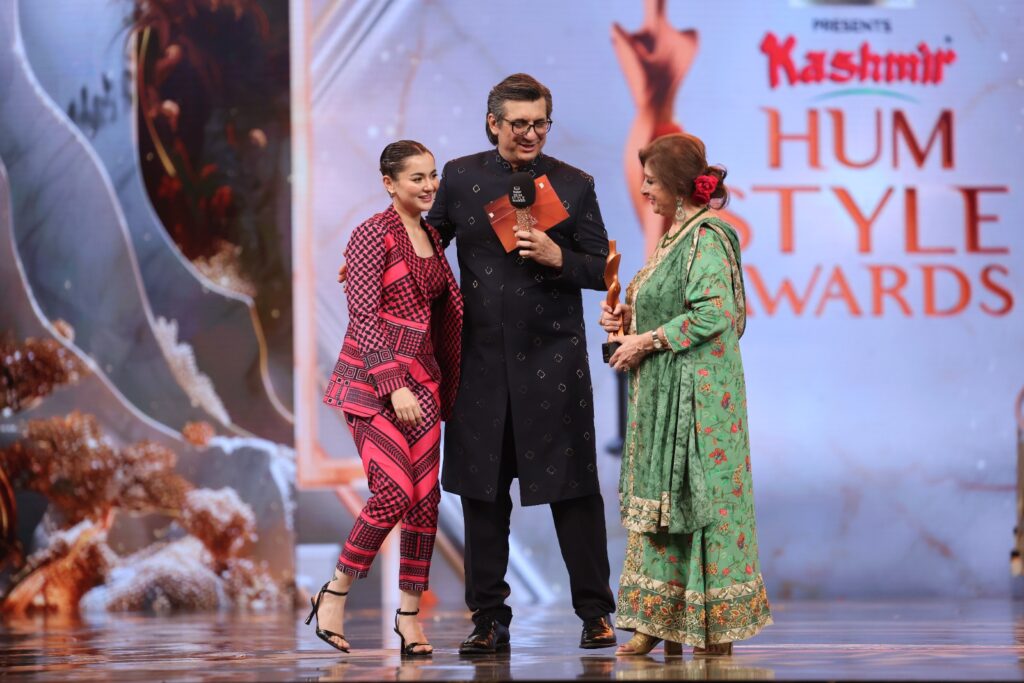Entertainment
TRESemme Kashmir HUM Style Awards – the Most Anticipated Night of Glitz & Glamour – concludes on a High Note!

The ‘TRESemme (presents) Kashmir HUM Style Awards’, the premier celebration of Pakistan’s fashion, beauty, and entertainment, turned out to be a resounding success on May 11, attracting the who’s who of the fashion world including celebrities, fashionistas, and influencers from various walks of life. The ceremony was a masterclass in production values, with high-quality visuals and performances that left the audience in awe.

As the guests arrived, the energy was palpable as they were treated to a roaring red carpet experience like no other, setting the tone for an unforgettable evening. While the photographers captured the glamourous attires and looks of the evening, the attendees mingled with the industry stalwarts, eagerly awaiting the commencement of the ceremony.

The HUM Style Awards, in its 6th edition – honoured the crème de la crème of Pakistan’s fashion and entertainment industry. The nominees were chosen by a panel of esteemed judges, included some of the biggest names in showbiz.
The Red Carpet host for KHSA was Sabeen Syed while HSY, Kiran Malik, and Zahid Ahmed stepped up as hosts for the evening. Additionally, the event was also available for the digital audience to enjoy, with renowned influencer Taimuri hosting on the digital platform.

The event kicked off with a phenomenal performance titled ‘KHSA Anthem’, a musical act composed by Adnan Dhool featuring Aima Baig, Faris Shafi, and Adnan Dhool, which included a song called ‘Million ka Daur’ on the impact of social media on our lives. The costumes for the lead performers were designed by Fahad Husayn. Next up was Asim Azhar, who showcased an impressive medley from his new album ‘Bay Matlab’, joined by Talha Yunus. Jazib Qamar styled the outfit for them.
One of the highlights of the evening was a captivating dance performance by Khaqaan Shahnawaz, Mamya Shah Jafer, and Shuja Asad, with wardrobe and styling by Imran Rajput.
The final act was a solo musical medley by Bilal Saeed, whose outfit was designed by Vestido 1.

This year, in the FASHION segment, the awards were given in the following categories: Best Model – Male and Female, Rising Star 2024, Hair & Makeup Artist of the Year, Fashion Photographer of the Year, Designer of the Year – Bridal, Designer of the Year – Lawn, Designer of the Year – Men’s Wear, Designer of the Year – Prêtwear, Retail Brand of the Year, Fashion Videographer of the Year, Fashion Art Director and Fashion Stylist of the Year.

In the ENTERTAINMENT segment, the awards were given in the following categories: Most Stylish Content Creator, Most Style Sports Personality, Most Stylish Performers – Male and Female, Most Style Actors (Television) – Male and Female and Most Stylish Actors (Film) – Male and Female.
KHSA featured two new categories this year: Art Director and Content Creator.

The show was designed and executed entirely by the HUM’s ‘Special Projects & Events’ team.
The official partners included N-Pro and N-Gents for hair and makeup, Ahsan Qureshi for photography, Shezzy Khan for choreography, Hunny Khan for wardrobe styling, J DOT Fragrances, Esfir Jewels, Gul Khan Truck Art – Handmade in Pakistan for gifts and heritage and Fly Jinnah as airline partner.
The Winners
VIEWER’S CHOICE AWARDS CATEGORIES
1. Most Stylish Content Creator: Sona Rafiq
2. Most Stylish Sports Personality: Shoaib Malik
3. Most Stylish Performer Male/Female: Faris Shafi, Asim Azhar
4. Most Stylish Actor Television – Female: Hania Amir
5. Most Stylish Actor Television – Male: Shahroz Sabzwari
6. Most Stylish Actor Film – Female: Kiran Malik
7. Most Stylish Actor Film – Male: Fahad Mustafa
FASHION CATEGORIES
1. Best Model Female: Abeer Asad Khan
2. Best Model Male: Subhan Umais
3. Rising Star 2024: Saboor Akram, Manto
4. Hair & Makeup Artist of the Year: Qasim Liaqat
5. Fashion Photographer of the Year: Asad Bin Javed
6. Designer of the Year – Bridal: Shehla Chatoor
7. Designer of the Year – Lawn: Fahad Hussayn
8. Designer of the Year – Menswear: Munib Nawaz
9. Designer of the Year – Pret Wear: Rastah
10. Retail Brand of the Year: Khaadi
11. Fashion Videographer of the Year: Muzamil Garewall
12. Fashion Art Director: Hashim Ali
13. Fashion Stylist of the Year: Mamoon Tariq
About HNL
HUM Network Limited (HNL) is a premiere Pakistani news and entertainment network with a global presence. Incorporated in 2004, HUM TV has been the first electronic media company in Pakistan to be listed on the Pakistan Stock Exchange. The network went live with its first entertainment channel HUM TV in 2005. Their second venture, Masala TV was launched in 2006 and has been Pakistan’s first 24-hour cooking channel to date. In 2009, the network announced Style 360 – the first complete lifestyle channel of its kind in the country, which has now been renamed to HUM Sitaray. In 2010, the network began broadcasting in all 50 states of the US, followed by the MENA region, as well as Australia and New Zealand. In 2018, HNL launched HUM News – one of the most trustworthy news sources in the country. The most recent entrant into the HUM family has been ‘Ten Sports’ of which HNL acquired the rights in 2023.
